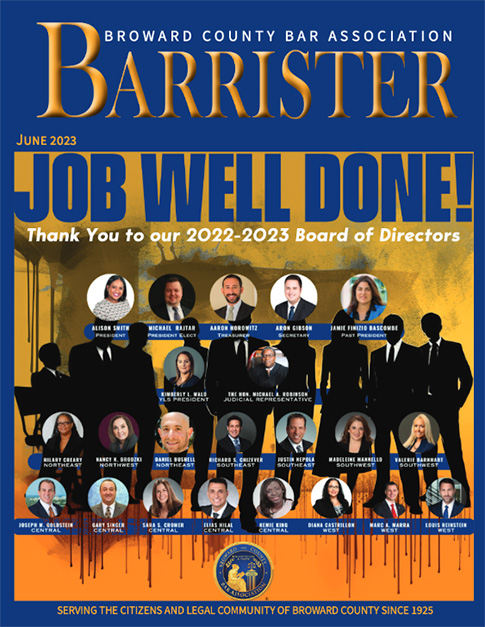
BARRISTER JUNE 2023 by Peggy Gehl: Updates on ADR Rules and Procedure
After nearly four years of zooming depositions, mediations, arbitrations, and seminars, the Florida Supreme Court determined the Covid-19 health and safety accommodation of remote technology required a permanent change to its rules. Effective October 1, 2022, The Court approved amendments to the Florida Rules of Civil Procedure and Rules of General Practice and General Administration, as well as criminal, traffic, probate, small claims, and appellate rules.*
Provision for remote technology is here. And, the default position for mediations and arbitrations is a return to the conference rooms in person —a return to our previous reality.
But, Zoomers have become accustomed to Zoom or other videoconferencing platforms—the relaxed format, the no-travel benefit, the hassle-free parking, and the casual wear in a comfy in-home or office setting. Many mediators and arbitrators are resisting a return to the person-to-person venue. For these Zoomers, there is provision in the amended rules for remote technology use in mediations and arbitrations with court approval or stipulation.
Rule 1.700(a) F.R.Civ.P. (2022) added the following language to mediation and arbitration referrals by the presiding judge or by stipulation:
The order of referral or written stipulation may provide for mediation or arbitration to be conducted in person, through the use of communication technology… Absent direction in the order of referral, mediation or arbitration must be conducted in person, unless the parties stipulate or the court, on its own motion or on motion by a party, otherwise orders that the proceeding be conducted by communication technology or by a combination of communication technology and in-person participation. (Emphasis added).
“Communication technology” is defined in Fla.R.Gen.prac.Jud. Admin.2.530 (3) as “audio communication technology or audio-video communication technology.”
There are excellent reasons to return to in-person mediations and arbitrations. The influence skills of the mediator may be enhanced in person with voice inflection, personal charisma, and eye-to-eye communication. The attorneys and parties may respect the formality of the conference. They may behave more professionally and take their cases more seriously. Attorneys and parties are less likely to divert their attention to other matters or become distracted by barking dogs or other household commotions. Executing a written agreement in person may carry greater accountability than a Doc-U-Sign. For arbitrations, the exchange of evidence is far easier in person. Attorney arguments can be more persuasive in person than on a computer screen.
And, of course, wearing a suit or dress rather than a dress shirt, tie, and jacket with running shorts or workout pants, makes one feel more like lawyering!
Naturally, for those parties and attorneys residing in other jurisdictions, or for those who are physically challenged or terrified of formal courtroom-like experiences, communication technology is a more relaxed, economic, and seamless venue than relying on unreliable airline schedules, traffic jams, and expensive travel.
Whether in-person or a combination of in-person and communication technology, or just communication technology, Circuit Civil Administrative Judge Carol-Lisa Phillips has expressed the courts’ appreciation for all the hard work and assistance mediators and arbitrators have provided. The Broward bench is grateful for aid in resolving cases, reducing the caseload, and narrowing issues when trial becomes necessary.
Of note for Arbitrators and County Court Mediators are new Administrative Orders entered by Chief Judge Jack Tuter earlier this year. Administrative Orders can be found on the 17th Judicial Circuit website.
A.O. 2023-10-Civ, entered on February 22, 2023, is entitled “Procedures for Non-Binding Arbitration,” and includes five (5) approved forms for use by arbitrators and arbitrator applicants. Each applicant who wishes to be listed as qualified to serve as an arbitrator, at the pleasure of the Chief Judge, for civil Circuit and County matters must complete an arbitrator application, returnable to the Court Mediation and Arbitration Program (CMAP), Room 19150 at the Broward County Courthouse.
The Chief Judge will maintain two (2) lists of qualified arbitrators: arbitrators who are members of the Florida Bar, and arbitrators who are not members of the Florida Bar. Some attorneys request only certified mediators or qualified arbitrators who are also members of the Florida Bar.
Only arbitrator applicants who meet the qualifications set forth in Florida Rules for Court-Appointed Arbitrators, Fla.R.Arb.11.010 and 11.020, will be approved by the Chief Judge, and therefore qualified for appointment by the presiding judges. If any party to an action has been declared indigent, the case may not be referred to arbitration.
Orders of referral to non-binding arbitration, arbitrator acceptance forms, and notices of arbitration are also attached to the A.O. Procedures, and requirements of arbitration are included in the forms.
On an administrative note, arbitration statistical summaries must be completed and returned to CMAP. A qualified arbitrator can be bumped from the Chief Judge’s list for failure to submit statistical summaries.
Complaints against arbitrators may be submitted to the Chief Judge. Arbitrators have thirty (30) days to respond. The Chief Judge will review the complaint and response and render a decision. Said decision is subject to appeal.
For certified county court mediators, Chief Judge Tuter entered AO 2023-6-CO on February 15, 2023, which, among other things, permits charging mediation fees on COINX** cases and cases seeking more than $30,000.00 in damages up to $350.00 per hour. All other county court cases may not be charged mediation fees of more than $250.00 per hour.
Florida Supreme Court mediators are appointed to county cases by rotation from a wheel maintained by our current County Court Administrative Judge, Robert W. Lee. For cases seeking less than $15,000.00 in damages, the presiding judge may refer the parties to CMAP for mediation.
Florida law does not permit the referral of cases greater than $15,000.00 to the lower-cost CMAP process.
If the parties disagree with the mediator referred by the presiding judge, they must stipulate to a different mediator within fifteen (15) days after the court enters the order of referral to mediation, and copy CMAP with the stipulation. The parties must use the court-referred private mediator if they fail to timely stipulate to a different mediator. See para. 3, A.O. 2023-6-CO. (emphasis added).
All mediators and arbitrators who are willing to schedule a conference at the last minute (10 days or less) can join a “Quick Mediation/Arbitration” list circulated by Judge Phillips. Parties who have not complied with the Uniform Trial Order (UTO) or had delays in scheduling mediation or arbitration can request the presiding judge for a “quick” referral. Only certified mediators and qualified arbitrators can enroll.
Circuit Civil Judge David Haimes spoke to the Broward Bar in March about the process circuit judges use to appoint mediators and arbitrators:
“When completing our UTOs we are provided a drop-down menu of certified mediators, or the choice ‘whomever the parties agree upon.’ The Chief Judge maintains a second list for appointing non-binding arbitrators. All appointed arbitrators must be qualified.”
Judge Haimes explained the effect of recently-issued, first-party water damage UTOs:
“Trial orders regarding first-party water damage cases provide that mediation must be conducted within 60 days from the date of the UTO. However, non-arbitration is delayed to 45 days prior to calendar call. This gives the litigants more time to prepare the case for arbitration and trial.”
“County court judges similarly use wheels for both mediation and arbitration referrals,” noted Judge Lee. “These lists are comprised of those neutrals expressing an interest in handling County Court cases, and who must be county court certified.”
Mediators and arbitrators desiring to be added to either County Court wheel should contact Judge Lee’s judicial assistant, Jose Corilloclla at jcorilloclla@17th.flcourts.org.
Mediators and arbitrators handling Broward cases are expected to take an active role in ensuring that deadlines and other requirements contained in the referral order are met.
“The days for passively waiting for attorneys to make the first contact have long passed,” added Judge Lee.
For any questions regarding the Court Mediation and Arbitration Program (CMAP), including statistics it maintains, mediation fees, contracted mediators, or qualifications for referral, please contact the office of the ADR director, Brittany Simpson Joseph, at 954-831-6075, located in room 19150 of the Broward County Courthouse.
*See In re Amendments to Florida Rules of Civil Procedure, et al. No. SC21-990 (Fla. July 14, 2022).
** See A.O. 2021-35-CO. COINX cases: All county court civil actions where the sole defendant is an insurance company shall be exclusively filed at the Central Courthouse location, and randomly assigned by the clerk to all civil locations.
You can also view the article on page 26 in BARRISTER.
